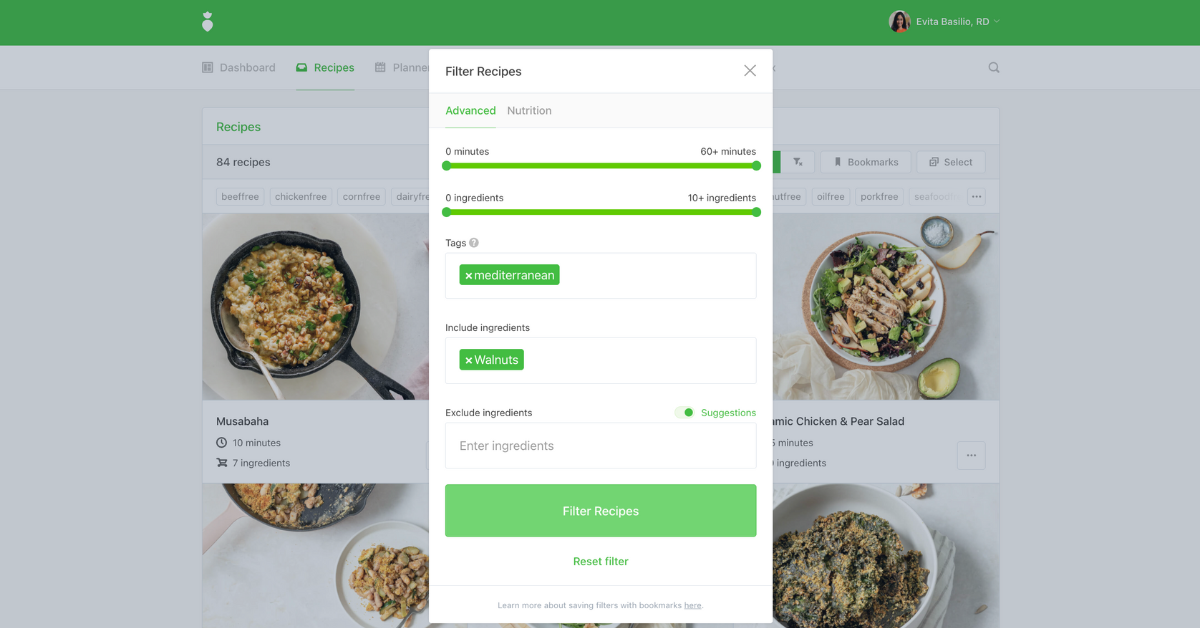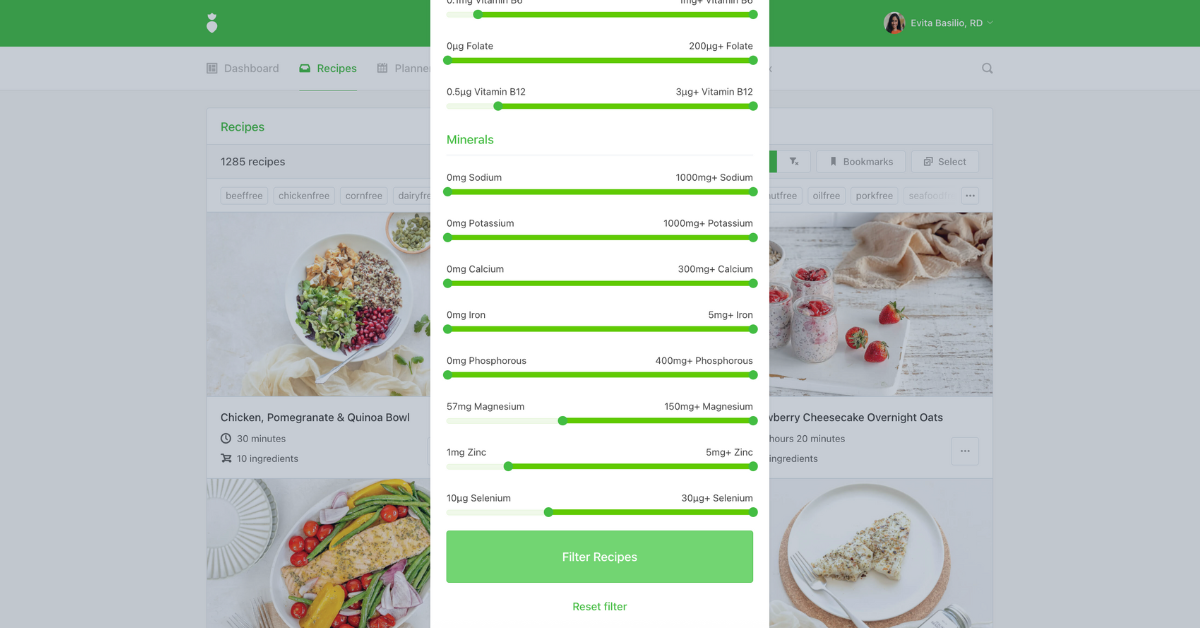If your clients are living with asthma, Chronic Obstructive Pulmonary Disease (COPD), or pulmonary fibrosis, their lungs are working harder than most. While medication and lifestyle changes are essential, nutrition for lung health is often overlooked and can make a significant difference.
To support your work with clients managing chronic respiratory conditions, we’ve created two new done-for-you meal plan templates: Lung Health Support Program and Plant-Based Lung Health Support Program.
These whole-food-based plans are designed to help reduce lung inflammation, support immune health, and enhance respiratory function with balanced, anti-inflammatory meals.
In this blog, we’ll explore the science behind nutrition for lung health and how these new programs can support better outcomes for your clients.
Why Nutrition Matters for Lung Health
The lungs are constantly exposed to environmental stressors, such as pollutants, allergens, and oxidative damage. Over time, this can worsen inflammation and weaken lung tissue, especially for individuals with chronic conditions like asthma, COPD, and pulmonary fibrosis.
Research shows that a lung-friendly diet rich in antioxidants, omega-3 fatty acids, fiber, and essential micronutrients can help:
- Reduce airway inflammation
- Improve lung function
- Boost immunity and tissue repair
- Decrease symptom severity
The new Lung Health Support Programs translate this research into practical, food-first guidance that clients can easily follow.

What’s Inside the Lung Health Support Meal Plans?
Both meal plan templates—omnivore and plant-based—are built around the latest evidence in nutritional strategies for lung health.
Anti-Inflammatory & Antioxidant Foods for Lung Support
Chronic inflammation is a key driver of many lung diseases. These plans emphasize antioxidant-rich foods that protect lung cells and reduce oxidative stress.
Included foods:
- Fruits and vegetables rich in antioxidants like vitamin C, vitamin E, and beta-carotene, such as leafy greens, berries, citrus fruits, and tomatoes
- Turmeric and ginger (natural anti-inflammatories containing curcumin)
- Green tea (shown to reduce lung fibrosis and boost antioxidant levels)
What to Limit:
- Processed and fried foods as they promote inflammation
- Sugary snacks and beverages, which can exacerbate oxidative stress and inflammation.
These ingredients can help mitigate lung damage and support tissue healing.

Omega-3 Fatty Acids to Reduce Lung Inflammation
Both meal plans follow a Mediterranean Diet-inspired approach, known for its anti-inflammatory benefits. Key omega-3-rich ingredients include:
- Fatty fish like salmon and sardines (in the omnivore version)
- Walnuts, flaxseeds, chia seeds, and olive oil
Studies suggest that diets high in unsaturated fats may reduce airway inflammation and improve lung capacity in individuals with COPD and asthma. Limit saturated and trans fats from processed meats, deep-fried foods, and baked goods, as these may contribute to inflammation and negatively impact cardiovascular health.
Tip: Using That Clean Life, you can filter for recipes that follow the Mediterranean eating pattern and include ingredients like walnuts.

High-Fiber Foods & Whole Grains for Lung Health
Fiber isn’t just for digestion—it reduces systemic inflammation, which can positively impact lung function.
These plans feature:
- Whole grains like oats, barley, and quinoa
- Legumes, including lentils, beans, and chickpeas
- Vegetables and fruits with high soluble and insoluble fiber content
A fiber-rich diet can also support a healthy gut microbiome, which has downstream effects on immune regulation and lung health.

Key Micronutrients for Respiratory Support
Several micronutrients are essential for lung function and immune resilience. These plans provide food-based sources of:
- Magnesium – supports bronchial muscle relaxation
- Zinc and Selenium – powerful antioxidants
- B Vitamins – essential for energy and respiratory muscle health
Food sources include fortified dairy, Brazil nuts, oysters, seeds, and leafy greens—all of which are featured in the meal plans.
Tip: Using That Clean Life, you can filter for nutrients like zinc, magnesium, selenium and B vitamins.

Managing GERD and Other Lung-Related Triggers
Many individuals with lung conditions also struggle with acid reflux (GERD), which can exacerbate respiratory symptoms. The Lung Health Support Programs include strategies to:
- Avoid common GERD triggers like spicy, acidic, or overly fatty foods
- Reduce sodium intake, as excess sodium can cause fluid retention and increase breathing difficulty
- Choose anti-inflammatory beverages like green tea and herbal infusions

Tip: Using That Clean Life, you can filter for recipes that exclude known food triggers for your client.
Lifestyle Considerations
In addition to a nutrient-dense, anti-inflammatory diet, certain lifestyle habits can significantly impact respiratory wellness. Supporting your clients in adopting these daily practices can enhance the effectiveness of nutrition interventions and promote overall lung function.
- Meal timing and portion control: Eating smaller, more frequent meals throughout the day can reduce bloating and pressure on the diaphragm, making breathing easier.
- Mindful eating: Encourage clients to chew slowly and thoroughly to support digestion and prevent shortness of breath during meals.
- Regular physical activity: Gentle, consistent movement such as walking, yoga, or pulmonary rehabilitation exercises can improve lung capacity and overall endurance.
- Adequate sleep: Quality rest is essential for immune function, inflammation regulation, and recovery. Help clients develop healthy sleep routines that support respiratory health.
- Environmental considerations: Advise clients to minimize exposure to air pollutants, tobacco smoke, allergens, and strong chemical fumes that can irritate the lungs.
- Stress management: Breathing exercises, mindfulness, and relaxation techniques can reduce anxiety, which can often worsen respiratory symptoms.
When combined with a lung-supportive nutrition plan, these small but impactful lifestyle shifts provide a comprehensive, food-first approach to managing chronic respiratory conditions.
Benefits of the Lung Health Support Meal Plans
That Clean Life's done-for-you templates are designed to help practitioners and clients easily implement nutrition changes. Each plan includes:
- Customizable meal plans (omnivore & plant-based options)
- Itemized grocery lists
- Easy-to-follow prep guides
- AI Health Insights for smarter recommendations
- Clinical references to support your education and care
Whether you’re working with newly diagnosed clients or those managing long-term respiratory conditions, these plans provide the structure and tools needed to make impactful, food-based changes.
Start Supporting Your Clients' Lung Health with Nutrition
Nutrition isn’t a replacement for medical treatment, but it’s a powerful complement. A strategic, nutrient-rich diet can make a measurable difference in how your clients breathe, recover, and feel daily.
Explore the new Lung Health Support Programs and empower your clients to take a food-first approach to respiratory wellness.
